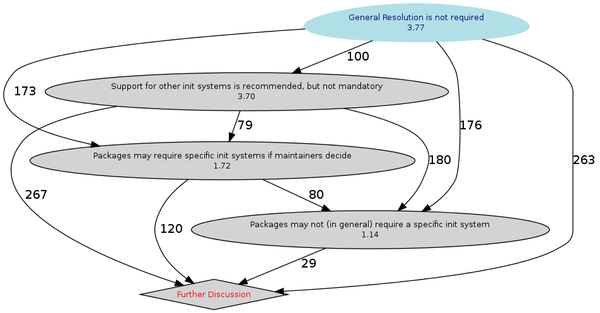on perceived hysteria and silent sanity
As you probably already know by now, the results of the Debian init system coupling general resolution (GR) look like this:
 |
Some random thoughts about them:
-
The turnout has been the highest since 2010 DPL elections and the 2nd highest among all GRs (!= DPL elections) ever. The highest among all GRs dates back to 2004 and was about dropping
non-free. In absolute terms this vote scores even better: it is the GR with the highest number of voters ever.Clearly there was a lot of interest within the project about this vote. The results appear to be as representative of the views of project members as we have been able to get in the second half of Debian history.
-
There is a total ordering of options (which is not always the case with our voting system). Starting with the winning option, each option in the results beats every subsequent option. The winning option ("General resolution is not required") beats the runner-up ("Support for other init systems is recommended, i.e., "you SHOULD NOT require a specific init") by a large margin: 100 votes, ~20.7% of the voters. The winning options wins over further options by increasingly large margins: 173 votes (~35.8%) against "Packages may require specific init systems if maintainers decide" (the MAY option); 176 (~36.4%) against "Packages may not require a specific init system" (the MUST NOT option); 263 (~54.5%) against "Further discussion" (the "let's keep on flaming" option).
While judging from Debian mailing lists and news sites you might have gotten the impression that the project was evenly split on init system matters, at least w.r.t. the matter on the ballot that doesn't seem to be the case.
-
The winning option is not as crazy as its label might imply (voting to declare that the vote was not required? WTH?). What the winning option actually says is more articulated than that; quoting from the ballot (highlight mine):
Regarding the subject of this ballot, the Project affirms that the procedures for decision making and conflict resolution are working adequately and thus a General Resolution is not required.
With this GR the Debian Project affirms that the procedures we have used to decide the default init system for Jessie and to arbitrate the ensuing conflicts are just fine. People might flame and troll
debian-develas much as they want (actually, I'm pretty sure we would all like them to stop, but that matter wasn't on the ballot so you'll have to take my word for it). People might write blog posts and make headlines corroborating the impression that Debian is still being torn apart by ongoing init system battles. But this vote says instead that the large majority of project members thinks our decision making and conflict-arbitration procedures, which most prominently include the Debian Technical Committee, have served use "adequately" well over the past troubled months.That of course doesn't mean that everyone in Debian is happy about every single recent decision, otherwise we wouldn't have had this GR in the first place. But it does mean that we consider our procedures good enough to (a) avoid getting in their way with a project-wide vote, and (b) keep on trusting them for the foreseeable future.
-
[ It is not the main focus of this post, but if you care specifically about the implications of this GR on systemd adoption in Debian, I recommend reading this excellent GR commentary by Russ Allbery. ]
My take home message is that we are experiencing a huge gap between the public perception of the state of Debian (both from within and from without the project) and the actual beliefs of the silent majority of people that make Debian with their work, day after day.
In part this is old news. The most "senior" members of the project will remember that the topic of "vocal minorities vs silent majority" was a recurrent one in Debian 10+ years ago, when flames were periodically ravaging the project. Since then Debian has grown a lot though, and we are now part of a much larger and varied ecosystem. We are now at a scale at which there are plenty of FOSS "mass-media" covering daily what happens in Debian, inducing feedback loops with our own perception of ourselves which we do not fully grok yet. This is a new factor in the perception gap. This situation is not intrinsically bad, nor there is blame to assign here: after all influential bloggers, news sites, etc., just do their job. And their attention also testifies of the huge interest that there is around Debian and our choices.
But we still need to adapt and learn to take perceived hysteria with a pinch (or two) of salt. It might just be time for our decennial check-up. Time to remind ourselves that our ways of doing things might in fact still be much more sane than sometimes we tend to believe.
We went on 10+ years ago, after monumental flames. It looks like we are now ready to move on again, putting The Era of the Great systemd Histeria™ behind us.
